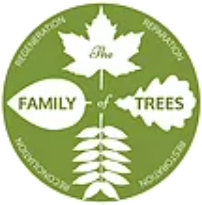Many of us strive to live environmentally conscious lives. However, we often do not realize that we have the ability to make some of the same green decisions regarding our deaths as we have made throughout the rest of our lives – we can choose a natural, eco-friendly death. Although many may be uncomfortable thinking about or making arrangements for their own death, it makes good sense that our decisions about death be compatible with the choices we have made in life.
Unfortunately, many in the funeral and cemetery industries which are largely controlled nationwide by three conglomerates, see our deaths as one last commercial opportunity, with the average nationwide cost of a funeral reaching $5,000-8,000. Contrary to popular belief, our final rite in our life cycle does not need to be financially straining. Our deaths can and should be so much more meaningful to us and to our survivors than simply a final commercial transaction.
What is natural death? Actually, natural death may be defined by several elements. “Natural” may refer to how one’s body is treated following death, it may refer to the final disposition of the body or remains, or it may refer to how one’s death is recognized by family and friends. Let’s look into a few ways one may choose a natural death.
Embalming is common only in the United States: A recently deceased body is injected with chemicals to preserve it temporarily, which many feel is useful for funeral viewings. Numerous people are put off by the idea of filling their bodies with chemicals (including formaldehyde) after their deaths. Many are under the impression that embalming is required by law. In fact, in Minnesota, embalming is only required by law when: the body will be transported by public transport, burial or disposition will occur over 72 hours after the death, the body will be publicly viewed or if ordered by the commissioner of health for control of infectious diseases. Furthermore, oral permission must be received by a mortician prior to embalming.
Another option we have in choosing a natural death is in determining where to deposit our final remains. It is fairly common for eco-minded people to choose to be cremated, since cremation does not consume the valuable land space that burial does. However, it is important to note that cremation releases pollutants. For an environmentally friendly cremation, choose to have ashes spread in a memorial garden. These are areas to encourage the remembrance of those who have passed away, and are often official gardens at a church or other institution, or perhaps a simple family garden. One’s ashes can be spread on the soil at the foot of a newly planted tree or bush, to commemorate planting a new life as a part of individuals’ legacies. There are also entire memorial parks designed to save and restore wild-lands, called Memorial Ecosystems. Visit www.memorialecosystems.com/mission.html to learn more.
For burial, it is important to remember that we, and what we put ourselves in, are placed directly into the ground. Many common caskets are made from chemically-treated woods, or metals that will never biodegrade. However, by law, anyone is permitted to build and decorate his or her own wooden or cardboard casket. These caskets offer a non-treated, less expensive alternative, and funeral homes must accept the casket of your choice, regardless of from where it comes. It is illegal for funeral homes to charge fees for caskets not purchased through them. No state law requires coffin vaults or grave liners, though cemetery policies vary.
Some people choose to donate their bodies or organs for medical use after death. Organ and whole body donations are distinct options; the donor must choose between the two. Because many donated bodies are rejected at the time of death for various reasons, donors should prepare alternate final disposition plans. Whereas bodies are ultimately cremated following whole body donation, tissue/organ donation does not interfere with funeral service preferences.
One of the most crucial elements in practicing natural death is the recognition of the significance of our deaths to us and to those we leave behind. Caring for the dead in a meaningful, loving and respectful way can make all the difference when faced with saying goodbye to loved ones. Caring for our own can include participating in creating and decorating a casket; handling some or all of the care of the body’s washing, dressing, and transportation; and creating a meaningful memorial or funeral service. Conducting a ceremony at home is one more way to ensure that the grieving process occurs in a comfortable and loving atmosphere. Holding a funeral or memorial service at home is legal in Minnesota.
Finally, when considering natural death options, why not pre-arrange to donate the funds you saved to a green organization? While an uncomfortable subject for many, choosing a natural death can be an important final gift to the world and loved ones we worked so hard to take care of in life.
| What You Can Do
* Be an educated consumer. Know your rights. Many people have reported being mistreated or taken advantage of by funeral homes and morticians. A loved one’s death can leave us vulnerable to suggestion or quick to make important decisions. * Let your loved ones know your after-death wishes. This is the best way to ensure that they are followed. * Plan your funeral/memorial service with loved ones. It will be an even more meaningful service if they know it was planned with love, and without the pressure of a deadline (no pun intended). * Shop around for untreated wood or cardboard coffins. Cardboard coffins may not be easy to find in Minnesota, but they are highly economical (as little as $25) and can easily be shipped. * Decide on what a natural death means to you, and celebrate the ability to give this final gift to your world! |
Caring for the Dead: Your Final Act of Love, Lisa Carlson
Dealing Creatively with Death: A Manual of Death Education and Simple Burial, E. Morgan
Anatomical Gift: Whole Body Donation Guide, Regina Lee
121 E. Seventh Place
Suite 400
St. Paul, MN 651-282-3829







